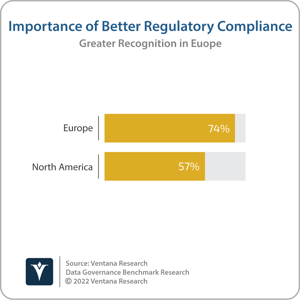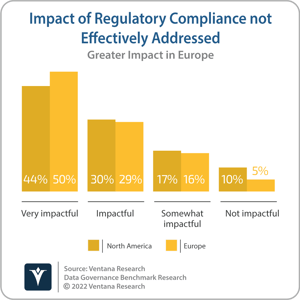Data governance is an issue that impacts all organizations large and small, new and old, in every industry, and every region of the world. Data governance ensures that an organization’s data can be cataloged, trusted and protected, improving business processes to accelerate analytics initiatives and support compliance with regulatory requirements. Not all data governance initiatives will be driven by regulatory compliance; however, the risk of falling foul of privacy (and human rights) laws ensures that regulatory compliance influences data-processing requirements and all data governance projects. Multinational organizations must be cognizant of the wide variety of regional data security and privacy requirements, not least the European Union’s General Data Protection Regulation (GDPR). The GDPR became enforceable in 2018, protects the privacy of personal or professional data, and carries with it the threat of fines of up to 20 million euros ($22 million) or 4% of a company’s global revenue. Europe is not alone in regulating against the use of personally identifiable information (other similar regulations include The California Consumer Privacy Act) but Ventana Research’s Data Governance Benchmark Research illustrates that there are differing attitudes and approaches to data governance on either side of the Atlantic.
 Better regulatory compliance is seen as a benefit of investing in data governance by almost three-quarters (74%) of European organizations, compared to less than three-fifths (57%) of North American organizations. European organizations are also more concerned about failure to address regulatory compliance, with one-half (50%) rating it as very impactful (compared to 44% of North American organizations). In contrast, one in 10 North American organizations (10%) say failure to address regulatory compliance is not impactful to their organization, compared to only one in 20 European organizations (5%). European organizations are more mindful of regulatory compliance. However, the complexity of data regulations means that greater awareness can become a hindrance to increased investment in data governance, rather than an accelerator. More than one-third (37%) of European organizations cite regulatory compliance needs as holding back improvements to data governance, compared to 27% of North American organizations.
Better regulatory compliance is seen as a benefit of investing in data governance by almost three-quarters (74%) of European organizations, compared to less than three-fifths (57%) of North American organizations. European organizations are also more concerned about failure to address regulatory compliance, with one-half (50%) rating it as very impactful (compared to 44% of North American organizations). In contrast, one in 10 North American organizations (10%) say failure to address regulatory compliance is not impactful to their organization, compared to only one in 20 European organizations (5%). European organizations are more mindful of regulatory compliance. However, the complexity of data regulations means that greater awareness can become a hindrance to increased investment in data governance, rather than an accelerator. More than one-third (37%) of European organizations cite regulatory compliance needs as holding back improvements to data governance, compared to 27% of North American organizations.
 Ventana Research’s latest Data Governance Benchmark Research also indicates different attitudes toward data governance among European organizations, compared to those in North America. For example, more European participants see data governance as being important to their organizations than their North American counterparts, and more European participants see the need to improve data governance in their organization than those in North America. This implies that European organizations are not only likely to have a lead over those in North America in relation to taking advantage of data governance but also that they are more likely to extend that lead. Other findings from Ventana Research’s latest Data Governance Benchmark Research support that implication. More than four-fifths (81%) of European organizations have implemented formal data governance policies and procedures compared to just over two-thirds (69%) in North America. European organizations are also more likely than North American organizations to publish data governance policies for those who create or consume data and substantially more likely to update their data governance policies on a regular basis (monthly, weekly or daily).
Ventana Research’s latest Data Governance Benchmark Research also indicates different attitudes toward data governance among European organizations, compared to those in North America. For example, more European participants see data governance as being important to their organizations than their North American counterparts, and more European participants see the need to improve data governance in their organization than those in North America. This implies that European organizations are not only likely to have a lead over those in North America in relation to taking advantage of data governance but also that they are more likely to extend that lead. Other findings from Ventana Research’s latest Data Governance Benchmark Research support that implication. More than four-fifths (81%) of European organizations have implemented formal data governance policies and procedures compared to just over two-thirds (69%) in North America. European organizations are also more likely than North American organizations to publish data governance policies for those who create or consume data and substantially more likely to update their data governance policies on a regular basis (monthly, weekly or daily).
Our Benchmark Research did not seek to ascertain whether the differing attitudes toward data governance in European organizations are the result of regulatory requirements or whether the differing regulatory requirements are the result of attitudes toward data governance. Most likely the two are mutually reinforcing. Either way, it is recommended that vendors offering data governance products and services take these differences into account when engaging with potential customers in Europe. Additionally, since the benefits of investing in data governance include improved data quality, more accurate reporting/business intelligence, and improved operational efficiency, organizations in both Europe and North America are recommended to accelerate their investment in data governance.
Regards,
Matt Aslett
 Better regulatory compliance is seen as a benefit of investing in data governance by almost three-quarters (74%) of European organizations, compared to less than three-fifths (57%) of North American organizations. European organizations are also more concerned about failure to address regulatory compliance, with one-half (50%) rating it as very impactful (compared to 44% of North American organizations). In contrast, one in 10 North American organizations (10%) say failure to address regulatory compliance is not impactful to their organization, compared to only one in 20 European organizations (5%). European organizations are more mindful of regulatory compliance. However, the complexity of data regulations means that greater awareness can become a hindrance to increased investment in data governance, rather than an accelerator. More than one-third (37%) of European organizations cite regulatory compliance needs as holding back improvements to data governance, compared to 27% of North American organizations.
Better regulatory compliance is seen as a benefit of investing in data governance by almost three-quarters (74%) of European organizations, compared to less than three-fifths (57%) of North American organizations. European organizations are also more concerned about failure to address regulatory compliance, with one-half (50%) rating it as very impactful (compared to 44% of North American organizations). In contrast, one in 10 North American organizations (10%) say failure to address regulatory compliance is not impactful to their organization, compared to only one in 20 European organizations (5%). European organizations are more mindful of regulatory compliance. However, the complexity of data regulations means that greater awareness can become a hindrance to increased investment in data governance, rather than an accelerator. More than one-third (37%) of European organizations cite regulatory compliance needs as holding back improvements to data governance, compared to 27% of North American organizations. Ventana Research’s latest
Ventana Research’s latest 








